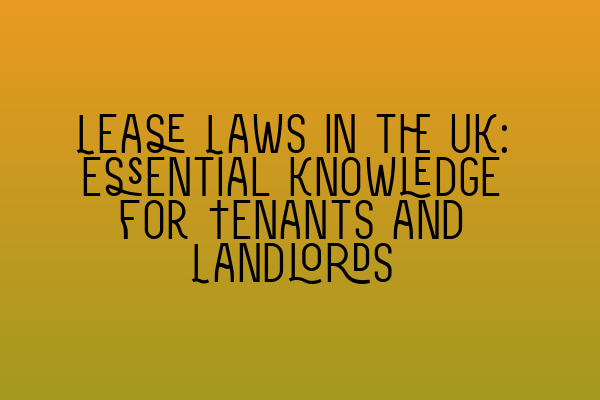Lease Laws in the UK: Essential Knowledge for Tenants and Landlords
In the world of property law, leasing is an integral aspect of the landlord-tenant relationship. Whether you’re a tenant or a landlord, understanding the lease laws in the UK is essential for protecting your rights and ensuring a smooth rental experience. In this blog post, we will provide you with the essential knowledge you need about lease laws in the UK, covering key aspects such as lease agreements, responsibilities, termination, and more.
1. Lease Agreements
At the core of the landlord-tenant relationship is the lease agreement. A lease agreement is a legally binding contract that outlines the terms and conditions of the rental arrangement. It provides clarity on rent, tenure, responsibilities, and other important aspects of the tenancy.
When entering into a lease agreement, it is crucial to carefully read and understand the terms stated. Tenants should pay attention to clauses related to rent increases, maintenance responsibilities, and rights to make alterations. Landlords, on the other hand, should ensure that the lease agreement protects their property and outlines their rights with regard to eviction and deposit deductions.
2. Tenancy Types
In the UK, there are different types of tenancies, and the lease laws vary depending on the type. The most common types of tenancies include assured shorthold tenancies (ASTs), assured tenancies, and regulated tenancies.
ASTs are the most common and are often used for private residential rentals. They typically last for a fixed term, usually six months or a year, and provide landlords with a legal basis to evict tenants after the fixed term ends.
Assured tenancies provide more long-term security to tenants and usually have no fixed end date. However, landlords have more limited grounds for eviction.
Regulated tenancies are protected by specific legislation and mainly apply to older tenancies. The rights and responsibilities of both tenants and landlords are heavily regulated in these types of tenancies.
Understanding the type of tenancy you have is crucial as it determines the applicable lease laws and the protection it offers.
3. Rent and Deposit Regulations
Rent and deposit regulations are key considerations for both tenants and landlords. The UK government has put in place various regulations to ensure fairness and transparency in these areas.
For tenants, it is important to understand the rent payment terms and any clauses related to rent increases during the tenancy. Landlords must adhere to rent increase rules and provide tenants with proper notice as per the law.
When it comes to deposits, the law requires landlords to protect them in a government-approved deposit protection scheme. These schemes aim to safeguard tenants’ deposits and ensure their return at the end of the tenancy, minus any legitimate deductions.
4. Repairs and Maintenance
Responsibility for repairs and maintenance is an essential aspect of the landlord-tenant relationship. The lease agreement should clearly state who is responsible for what.
Landlords are generally responsible for structural repairs, heating, and other major maintenance issues. Tenants, on the other hand, are typically responsible for minor repairs and day-to-day maintenance, such as changing light bulbs and maintaining cleanliness.
It is crucial for both parties to promptly communicate any repair issues and document the communication for reference.
5. Termination and Eviction
Lease laws in the UK provide guidelines for both landlords and tenants when it comes to terminating a tenancy. The notice period required for termination depends on the type of tenancy and the circumstances.
Landlords must provide proper notice and follow the correct legal procedures to evict a tenant. Similarly, tenants must provide the required notice period to terminate their tenancy.
Understanding the termination and eviction rules is crucial to avoid disputes and ensure a smooth transition for both parties.
In conclusion, knowledge about lease laws in the UK is essential for both tenants and landlords. It is important to carefully review lease agreements, understand the type of tenancy, adhere to rent and deposit regulations, communicate about repairs, and follow the correct procedures for termination and eviction.
If you want to dive deeper into contract law and other related topics, we recommend checking out these articles for further reading:
– SQE Contract Law: Analyzing Landmark Cases and Influential Judicial Decisions
– Understanding Contractual Capacity: Rights and Limitations
– Interactive SQE Mock Tests for Contract Law: Test Your Knowledge
– Join Our SQE Contract Law Webinars: Expert Insights and Guidance
– SQE Prep: Mastering the Essentials of Contract Law
At SQE Property Law & Land Law, we have a team of expert solicitors ready to assist you with any lease law-related queries. Contact us today for guidance and support in navigating the complex world of lease laws in the UK.
